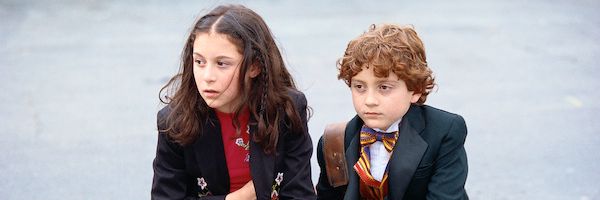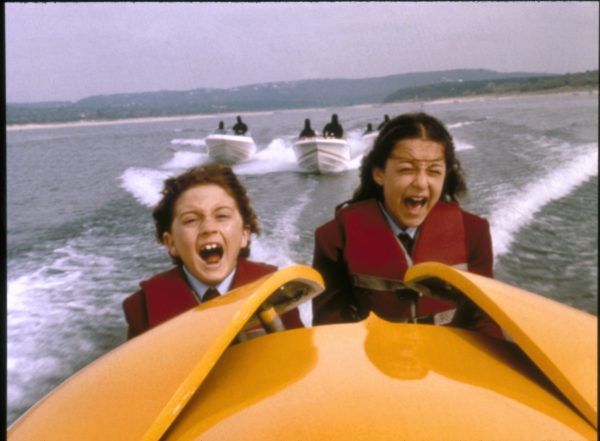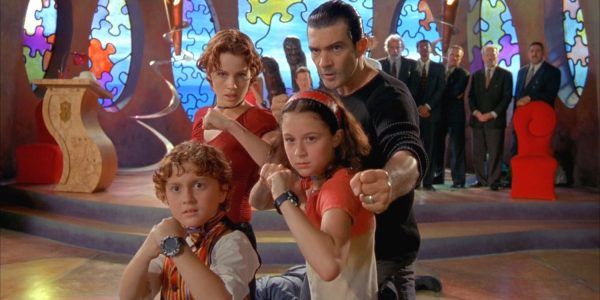In 2001, if you were of a similar age as I, you were watching Spy Kids on a VHS over and over again, and having a dang great time. The iconic family film from the iconically multi-talented Robert Rodriguez stars Alexa Vega and Daryl Sabara as the titular "kids whom are also spies," and they go on a globe-trotting adventure that also involves stars like Antonio Banderas, Carla Gugino, Alan Cumming, Cheech Marin, and Danny Trejo. It's a crackling piece of entertainment, and a huge benchmark in Latinx representation in the family film space.
And, as Rodriguez told our very own Steve Weintraub during our Comic-Con@Home "Directors on Directing" panel, it was a difficult battle getting the studio to see Rodriguez's vision of centering a family film around a Latinx family.
"For me, it was a big victory, and it was an important one for things to follow, to have the kids in Spy Kids be a Latin family. The studio was like, 'Why are you making them Latin, though? Why don't you just make them American?' And I was like, 'They are American, it's based on my family.' My uncle is actually — his name is Gregorio Rodriguez, he's a special agent in the FBI that was the only one to bring down two top ten [most wanted] criminals. That's who the Antonio character's based on. And I wanted to make a movie about my family, 'cause I grew up in a family of 10 kids, a big Latin family, but I thought, 'Well, I should make them spies so it's more interesting for people. So it's not just about my family.'"
This was an immensely personal story for Rodriguez, to the point where all of the main characters were named after members of his family (Vega's Carmen is Rodriguez's sister, Sabara's Juni is his brother, Banderas' Gregorio is his uncle, Marin's Felix is another uncle, etc.). And even though the studio responded to Rodriguez's personal pitch with the beyond irresponsible misunderstanding between "American" and "Latin," Rodriguez approached his response with empathy:
"It had just never been done before. When you're doing anything that's new — this just happens to be about diversity, but it could be anything — when you're doing anything new, you're gonna get questioned. And you have to have a good answer, because they're not being dicks or anything, they've just never seen it before. 'Is it gonna make the audience smaller?' People think only Latins will go see it. And it's just 'cause it had never been done before. I said, 'No, I don't think so, I mean they're only gonna speak Spanish as a kind of code when it's cool. And they are American, they're just Latin, 'cause it's based on my family.' It wasn't really convincing. I finally had to come up with a good argument. Finally, I said, 'Okay, you don't have to be British to enjoy James Bond. By being so specific, it becomes more universal.' So they went with it, then of course there's like four [Spy Kids films in the franchise] and now we're rebooting it. But you kind of had to put your flag in and set it in and say, 'This is how it's gonna be done' to make any change, 'cause there was no roles being written for Latins at that time, back in 1999, nor were they being cast.
And if I wasn't Latin, I would've given up the fight, because I would've been [like], 'Okay, I just wanna get the movie made.' Because it was based on my family is the only reason I kept the fight up. And again, it wasn't a fight, they just weren't sure why I would attempt doing something that could possibly limit the audience. 'Cause it had just never been done before, to be proven wrong. And why prove it with this movie? And that can be with anything, a piece of technology or an idea that's new, that you would come up against as a filmmaker. You kind of have to make a stand and go, 'Look, this is kinda how I have to be.'"
Colin Trevorrow, also on the panel, then chimed in to "commend" his fellow filmmaker, saying he believed Rodriguez's push for representation on Spy Kids helped show studios that films with more diverse casts are "gonna make money and people are gonna come see the movie. That was a major choice for you. And for you to push for that and for it to work so well, I think it really did pave the way for studios to trust that choices like that were gonna work in the future." This led Rodriguez to offer thoughts on the point of moviemaking in general, and the legacy he hopes to leave behind.
"You see that any kid can watch that movie and they enjoy that movie. For those who are Latin in particular, it means so much to them. It changes their whole future about what is possible. I've had friends say, 'My kid laughed when they saw your name at the end. They go, 'Look, his name's Rodriguez! He's even Latin! The guy who made the movie!' So you just change their whole future of what's possible. That's an amazing thing that the power of media and the power of imaging and the power of what we do [has]. You can change people's minds, especially in a world where — it just seems like it's just going to Hell — media and entertainment and characters that an audience can see and model themselves after or be inspired by are the last chance to offer any kind of hope and ideas and ideals and values."
We may be on a track to Hell, but as Rodriguez himself says, we can still change what's possible about our future -- in part by telling these kinds of inclusive stories.
Check out the clip of Rodriguez discussing his film below. For more from our Comic-Con@Home panel with Trevorrow, Rodriguez and Kosinski, click here. For more on Rodriguez, check out what Star Wars property he's getting into.



